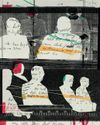
The National Monument to Freedom, in Montgomery, Alabama, is a giant book, standing forty-three feet high and a hundred and fifty feet wide. The book is propped wide open, and engraved on its surface are the names of more than a hundred and twenty thousand Black people, documented in the 1870 census, who were emancipated after the Civil War. On the spine of the book is a credo written for the dead:
Your children love you.
The country you built must honor you.
We acknowledge the tragedy of your enslavement.
We commit to advancing freedom in your name.
The history of slavery is one of elisions and silences, of moving on. The civil-rights attorney Bryan Stevenson, who designed the monument, has taken a different approach, displaying the realities of enslavement on a monumental scale. His colossal book is the centerpiece of the Freedom Monument Sculpture Park, which opens in late March. Set on a high bluff overlooking the Alabama River, the park presents a painstaking narrative history of slavery, using first-person recollections, historical artifacts, and more than fifty sculptures. The park is the third site in Montgomery created in recent years by Stevenson and his legal nonprofit, the Equal Justice Initiative.
This story is from the April 01, 2024 edition of The New Yorker.
Start your 7-day Magzter GOLD free trial to access thousands of curated premium stories, and 9,000+ magazines and newspapers.
Already a subscriber ? Sign In
This story is from the April 01, 2024 edition of The New Yorker.
Start your 7-day Magzter GOLD free trial to access thousands of curated premium stories, and 9,000+ magazines and newspapers.
Already a subscriber? Sign In

GET IT TOGETHER
In the beginning was the mob, and the mob was bad. In Gibbon’s 1776 “Decline and Fall of the Roman Empire,” the Roman mob makes regular appearances, usually at the instigation of a demagogue, loudly demanding to be placated with free food and entertainment (“bread and circuses”), and, though they don’t get to rule, they sometimes get to choose who will.

GAINING CONTROL
The frenemies who fought to bring contraception to this country.

REBELS WITH A CAUSE
In the new FX/Hulu series “Say Nothing,” life as an armed revolutionary during the Troubles has—at least at first—an air of glamour.

AGAINST THE CURRENT
\"Give Me Carmelita Tropicana!,\" at Soho Rep, and \"Gatz,\" at the Public.

METAMORPHOSIS
The director Marielle Heller explores the feral side of child rearing.

THE BIG SPIN
A district attorney's office investigates how its prosecutors picked death-penalty juries.

THIS ELECTION JUST PROVES WHAT I ALREADY BELIEVED
I hate to say I told you so, but here we are. Kamala Harris’s loss will go down in history as a catastrophe that could have easily been avoided if more people had thought whatever I happen to think.

HOLD YOUR TONGUE
Can the world's most populous country protect its languages?

A LONG WAY HOME
Ordinarily, I hate staying at someone's house, but when Hugh and I visited his friend Mary in Maine we had no other choice.

YULE RULES
“Christmas Eve in Miller’s Point.”